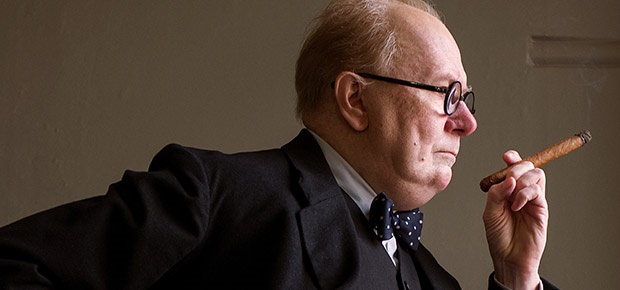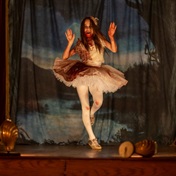
What it's about:
Within days of becoming Prime Minister of Great Britain, Winston Churchill must face one of his most turbulent and defining choices—exploring a negotiated peace treaty with Nazi Germany, or standing firm to fight for the ideals, liberty and freedom of a nation. As the unstoppable Nazi forces roll across Western Europe, the threat of invasion is imminent, and, with an unprepared public, a skeptical king, and his own party plotting against him, Churchill must withstand his darkest hour, rally a nation, and attempt to change the course of world history.
What we thought:
I have seen so many renditions of Winston Churchill I thought I couldn’t sit through another boring retelling of his life, the actor mumbling his way through his lines with sombre lighting and long stretches of dialogue. Darkest Hour, however, revitalised this historic figure for me, with Gary Oldman standing triumphant over Churchill’s famous speeches and wit, accompanied by creative and unique cinematography that capture England’s turmoil during World War II.
Joe Wright has managed to dust himself off after the Pan-atrocity and hit back with another stunning period-piece that he can do in his sleep. Darkest Hour proves that a biopic can be creative while sticking to the facts and provides a film that history haters can love.
Darkest Hour follows the start of Churchill’s reign as prime minister, and the days building up to Dunkirk and potential peace talks with Germany.
Oldman is a powerhouse of an actor. Not only was he unrecognisable in his Churchill makeup that took a total of 200 hours to put on, he was also nuanced and pure with his performance, making sure his previous iconic roles do not influence his character. A problem with previous actors depicting the political stalwart is that they mumble so much that you can barely hear the script, but even though they mention his mumbling in the film, Oldman’s tone and pronunciation makes sure that you never miss a beat, sucked in by his ‘weaponised words’. Without him this film may have faltered, and we’d have another version of the same old. He holds every scene in his clutches with his glasses, glass of scotch and his iconic cigar.
Oldman was supported by a great cast as well, including a script that paces itself even though it takes many liberties with historical facts. Writer Anthony McCarten is a wizard with words, builds scenes that flow evenly into each other, which is not surprising as he also wrote the script for Theory of Everything. But what made the film truly special besides Oldman was a truly magical cinematography, crafted by Bruno Delbonnel. At some points it feels like the visuals may overtake Oldman’s performance, but the two worked together for some of the best cinematic sequences.
My favourite by far is a slow-motion street scene, as Churchill drives by in his car, depicting normal Brits going about their daily lives. Later the scene is repeated, but this time it shows a sense of panic regarding the impending doom that’s heading to the country, and it’s so beautiful and tragic at the same time. It’s a bit sad that it’s more than likely that Delbonnel will lose his fifth Oscar nomination again, as he comes up against Blade Runner 2049 and Shape of Water, but any other year he would have won hands down.
There is one small thing that does blemish the film, and as a South African it’s worth calling the filmmakers out for. There’s one scene where Churchill takes the tubes to Westminster and has a talk with the common folk of Britain to suss out their views. It obviously never happened, but you understand why it’s important for the story in the context of the film.
But what really breaks this scene is the intense focus on a black man on the tube, who interacts the most with Churchill in what appears to be an affectionate manner, with the bulldog even touching his hand. Now this is where most South Africans will shout ‘fake news’. It’s no secret that he was the epitome of white supremacy, and his time during the Boer-war as well as his immigration policies leaves little love with black people and Afrikaners.
In the context of the film, it’s fine that they don’t address this as it focuses on his war politics and a very specific time period, but you wouldn’t have even thought about it if was not for the interaction with the black man. He is so prominent in that scene, even finishing a poem for Churchill, that you can’t believe the filmmakers did this by accident, and it really takes the film down by a few notches that could have easily been avoided.
Despite this one blemish, the Darkest Hour is the kind of history film that anyone will enjoy, packed with surprising wit, emotional drama and powerful speeches. Oldman already wrapped up a win at the Golden Globes and is a strong contender for serial Oscar winner Daniel Day Lewis for Best Actor. After watching Darkest Hour, you can’t help but root for Oldman to get his due.




 Publications
Publications
 Partners
Partners















